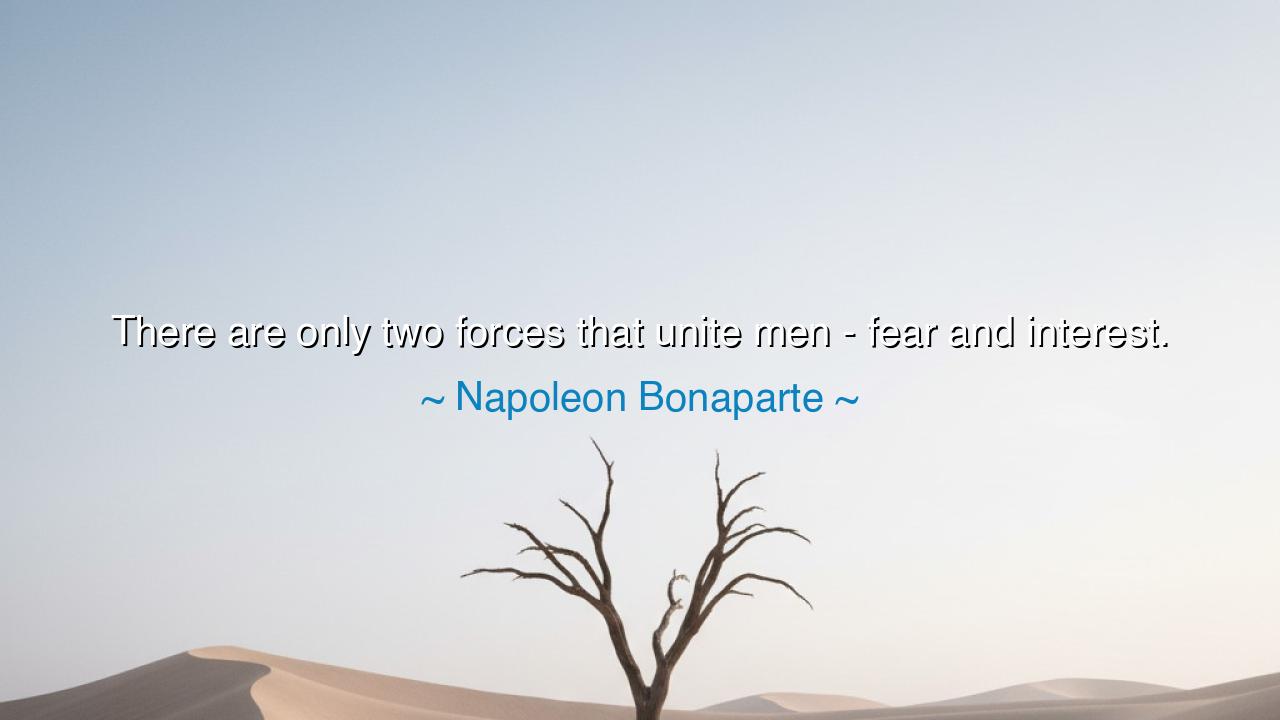
There are only two forces that unite men - fear and interest.






Host: The evening had settled into a comfortable stillness, the soft hum of the city outside barely reaching the room. Jack sat by the window, his fingers absentmindedly drumming on the glass, his gaze fixed on the world beyond but clearly lost in thought. Jeeny was across from him, her legs tucked under her, a cup of tea in hand, though her attention seemed to be focused on something far deeper than her drink. The silence between them felt heavy, as if a question or a thought was waiting to emerge.
Host: Napoleon Bonaparte’s words broke the quiet like a subtle challenge: “There are only two forces that unite men - fear and interest.” The simplicity of the statement felt both piercing and profound. It spoke to the primal forces that drive us as individuals, as societies, and as nations—fear and interest. But was that really all there was to it? Jack, always more inclined to think deeply about such ideas, was the first to respond.
Jack: His voice was calm, but there was a hint of curiosity: “I get what he’s saying. Fear and interest are powerful forces, no doubt. They drive decisions, actions, and even relationships. But I wonder if they’re the only two things that unite us. I mean, can’t love, empathy, or shared ideals pull people together just as strongly?”
Jeeny: She smiled slightly, her eyes thoughtful as she looked up from her tea: “I see where you’re coming from, but I think Napoleon’s point is that action—real action—is often driven by one of those two forces. Fear can create unity because it pushes people to act against a common threat, while interest unites us by aligning our goals and desires. The others—love, empathy, shared ideals—certainly play a role, but they’re not always as immediate or practical as fear and interest. Those two forces can mobilize people in a way that ideals or emotions sometimes can’t.”
Host: The air seemed to shift as she spoke, the weight of her words settling in. Jack’s usual skepticism was starting to fade, replaced by something more receptive, as though he were considering the complexity of what she had just said. The idea that unity often comes from forces like fear or self-interest, rather than more lofty ideals like love or compassion, was a thought that lingered between them.
Jack: His voice was now softer, almost reflective: “I get it now. Fear and interest are more immediate, more tangible. If we’re faced with a threat, fear unites us because it forces us to act. And if we have a shared interest, we naturally come together to achieve something. But it’s still hard to think that those two forces are the only ones that can unite people. Doesn’t love or kindness or mutual respect play a part?”
Jeeny: She leaned forward slightly, her expression calm but insightful: “They do, yes. But love, kindness, respect—they require a level of stability, of comfort. You have to already be in a position where you’re not fighting for survival or competing for the same thing. When fear or interest are in play, they provide the urgency that can rally people. In times of peace, love and respect can bring people together, but in moments of danger or need, fear and interest often create unity much quicker.”
Host: The room felt quieter now, the weight of their conversation settling in. The idea that unity could be built on fear and interest didn’t necessarily undermine the importance of love, kindness, or respect—it just highlighted how those more complex, softer emotions sometimes required a foundation of security before they could fully flourish. Jack’s usual resistance to simplistic explanations seemed to soften as he thought more about it.
Jack: His voice was calm, but the thought seemed to have settled deeply: “Maybe that’s why so many movements in history are born out of fear or self-interest—when people are pushed to act, when there’s no other choice. It’s not about what’s ideal or moral. It’s about what moves people to do something, anything. Maybe those are the driving forces we don’t always want to admit are at play.”
Jeeny: She nodded, her tone reassuring, almost gentle: “Exactly. And it doesn’t mean fear or interest are inherently bad. They can create real change when the situation calls for it. But we have to recognize them for what they are—powerful forces that drive us, sometimes in ways we don’t even notice. If we can understand them, we can use them more consciously, for good or bad.”
Host: The room seemed to take on a deeper, quieter meaning as they sat in that understanding. The world outside continued its rhythm, but inside, Jack and Jeeny had uncovered something new—an appreciation for the forces that shape action, whether we like them or not. Fear and interest, it seemed, weren’t just reactionary forces; they were foundational forces, the things that sometimes prompted us to come together when everything else failed.
Jack: His voice, now reflective, carried the weight of new insight: “Maybe that’s the real truth behind it. Fear and interest don’t just unite us—they shape us, in ways we don’t always realize. And it’s about finding a balance with the other forces, like love and respect, that can help guide those instincts.”
Jeeny: Her smile was gentle, filled with understanding: “Exactly. It’s about knowing that those forces exist, and learning to navigate them with the other parts of our humanity.”
Host: The night deepened, but inside, the conversation had revealed a deeper understanding of the forces that drive unity—and how they could be shaped, both consciously and unconsciously, by fear, interest, and everything in between. Jack and Jeeny sat quietly, knowing that sometimes, the most profound truths weren’t the ones we sought out, but the ones we uncovered when we examined the deeper currents running beneath the surface.






AAdministratorAdministrator
Welcome, honored guests. Please leave a comment, we will respond soon